by Gary Lord
Home - Genesis - 2007 - 2008 - 2009 - Early 2010 - Mid 2010 - Late 2010 - End 2010 - Early 2011 - Mid 2011 - Late 2011 - End 2011 - Early 2012 - Late 2012 - Early 2013- Late 2013 - 2014 - 2015 - Early 2016 - Late 2016 - 2017-19
Chapter Fourteen: Late 2012
Assange In The Embassy
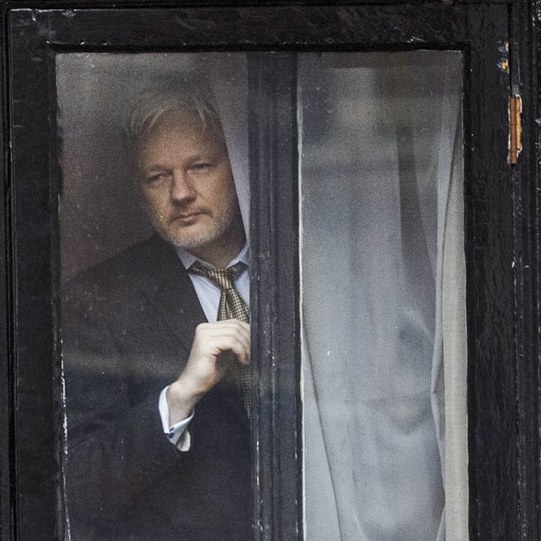
On 19 June 2012, Ecuadorian Foreign Minister Ricardo Patiño confirmed that Julian Assange was inside the Ecuadorian Embassy in London and had applied for political asylum. Assange told Ecuadorian officials that he had received a "factual statement of abandonment" from his own government, while top officials in Sweden had openly attacked him, and he was facing the death penalty in the USA. The government of Ecuador issued a statement saying they were considering the request "as a signatory to the United Nations Universal Declaration for Human Rights".
Ignoring Assange’s legal right to seek asylum, Scotland Yard immediately declared that Assange was now subject to arrest for breaching his bail conditions. Supporters who had helped Assange post £200,000 bail said they were surprised but not disappointed by his decision to seek asylum. Prominent US supporters including Michael Moore, Oliver Stone and Noam Chomsky sent a letter of support. Crowds of local supporters began gathering daily on the street outside the embassy, including Ecuadorian citizens calling for their government to offer asylum.
Ecuador had previously offered asylum to Assange in November 2010, when the Vice Chancellor stated: "We are open to grant him Ecuadorian residency, without any kind of problem or any kind of conditions." But President Rafeal Correa had quickly clarified that this offer was not official. Correa now insisted that his government’s decision on asylum would not be affected by pressure from other nations:
"If Assange’s life is at risk, that is sufficient cause to approve his asylum," he said. "The death penalty exists in the United States for political crimes."
Correa said the Ecuadorian government would "examine what the allegations are in Sweden, how the judicial process is carried out, and if it is compatible with the humanist vision of justice that we have in Ecuador".
Ecuador’s ambassador to the US warned that "giving asylum to Assange would be used as ammunition to attack the country." She said the recriminations "already have begun".
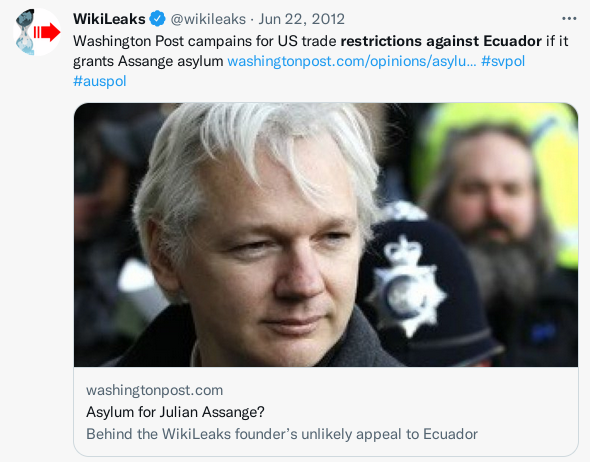
Two days after Assange entered the embassy, the Washington Post editorial board wrote that the US extradition concerns of Assange "the Australian hacker" were just a "fantasy" and President Correa, "a small-time South American autocrat", was seeking to become the world’s "chief Yanqui-baiter and friend-to-rogues". They noted that Ecuador relied on the US dollar as its official currency and a third of Ecuadorian exports went to the United States thanks to "special trade preferences".
Those preferences come up for renewal by Congress early next year. If Mr. Correa seeks to appoint himself America’s chief Latin American enemy and Julian Assange’s protector between now and then, it’s not hard to imagine the outcome.
*
Assange’s first interview from inside the embassy came on the same day, 21 June 2012, with Australia’s ABC News. Here’s how host Fran Kelly introduced her radio segment:
The 40 year old Australian walked into the Embassy on Tuesday in a dramatic bid to avoid extradition to Sweden for questioning over sexual assault allegations.
Assange immediately took issue with this framing.
I don’t know where you get that from. We’ve never said that’s the case, and that’s simply not the case. The issue is about a very serious matter in the United States and an announcement was made by the Swedes and the Swedish Government that I would be detained, without charge, in Sweden, immediately on extradition.
Assange said that being jailed immediately on arrival in Sweden would mean that his "ability to exercise an asylum right would be at an end" and his legal right to further appeal was already being blocked:
They tried to cancel the 14 days that I had here to apply to appeal the matter at the European Court of Human Rights… we had the surprise news that the Crown Prosecution Service here suddenly objected to the 14 days we were meant to have to file an EU appeal and were asking for zero.
Kelly suggested that seeking aslyum made Assange look more guilty; "it made you look like you’re on the run, desperate to avoid questions about those sexual assault allegations".
Assange replied that the Swedish prosecutor, if she really wanted to make progress on the case, was perfectly welcome to come to the embassy:
"The Ecuadorians have said she could come to the Embassy, she could pick up the telephone, like she could’ve picked up the telephone for the past 18 months, if that’s really what she is interested in."
Assange argued that the more interesting question was why he hadn’t sought asylum in the Australian embassy instead. Kelly played back audio from Australian officials claiming they had not seen or heard any indication of US legal action against Assange.
"But they are taking legal action!" exclaimed a "clearly agitated" Assange. "There have been nine prosecutors working this case! The evidence is everywhere, they’ve been issuing subpoenas to our ISPs, to the people I’ve been meeting, etc. It’s a matter of public record. They are taking legal action. They’ve taken action against Twitter! We’ve been fighting a legal case in the public record in relation to the Twitter subpoenas for over a year now…"
Assange said US and Australian officials were "just playing word games" because the US Department of Justice could not formally issue charges until the Grand Jury had finished its investigation. He said it was on the public record that the FBI’s case file "now runs to 48,135 pages" and the US government was spending "vast amounts of resources":
"I mean, just today it was discovered that a contract put out by the Department of Justice for one to two million dollars to maintain the WikiLeaks computer systems that the Department of Justice is running - one to two million dollars contracted to MANTEC as a matter of public record, just discovered today."
Australian Government Complicity
Three days later, Australian Foreign Minister Bob Carr continued playing word games on ABC’s "Insiders" political TV show. He insisted the Swedish legal case was "wholly unrelated, wholly unrelated to anything to do with WikiLeaks or state secrets". He said he had only discussed Assange’s situation twice with US officials but "I’ve received no hint that they’ve got a plan to extradite him to the US".
BARRIE CASSIDY: But he talks about this grand jury, the secret grand jury proceedings. Can you be satisfied this is not happening?
BOB CARR: Barrie, there’s not the remotest evidence that that’s the case. There was one allegation that appeared somewhere of something called a sealed indictment. No US figure has confirmed that to us. I suppose you could argue that they wouldn’t confirm it to us til the last moment.
This was of course complete nonsense. The Australian embassy in Washington had reported in 2010 that the US Grand Jury investigation of WikiLeaks was "unprecedented both in its scale and nature". Senator Ludlam later sent a letter to Bob Carr with copious evidence of the US Grand Jury and a sealed indictment.
BOB CARR: But I can say, what I’ve said to a senior US official: Assange is an Australian citizen, we’ve got an interest in this, have you got plans to extradite him? They haven’t said they have plans to extradite him. They haven’t been able to rule out that one corner of the American administration might not be considering it, but I would expect that the US would not want to touch this.
Note the use of double negatives and other evasive rhetorical tricks. Carr also mischaracterized Assange - a citizen falsely accused in global media of "double rape" - as a person of low morals, proclaiming that "releasing a whole batch of secret material without assessment and without justification raises profound moral questions… There’s an amorality about what’s been at work here." Never mind the morality of the war crimes and corruption WikiLeaks exposed.
Journalist Bernard Keane responded to Carr’s evasive nonsense with a list of questions the Foreign Minister could ask his US friends, if he actually cared to so so:
-
why is an Australian journalist the target of a US investigation simply for that journalism?
-
why is the Obama Administration stopping and interrogating activists who have been in contact with Assange when they attempt to travel internationally?
-
why is the Obama Administration orchestrating a financial blockade by major international financial intermediaries of WikiLeaks?
-
why did the Vice-President describe Assange as a terrorist?
-
why did the State Department, with no evidence, insist Assange is not entitled to protections under the First Amendment?
On 3 July 2012 Bob Carr again haughtily insisted that the USA clearly had no interest in Assange. Why? Because two years had now passed since the publication of the Afghan War Logs, and the USA still had not charged him. These foolish comments came just after Senator Dianne Feinstein, chairwoman of the US Senate intelligence oversight committee, repeated her calls for Assange to be prosecuted for espionage. At the same time, Carr’s Department of Foreign Affairs and Trade (DFAT) was blocking the release of documents that would show what the Australian government really knew about the US investigation of WikiLeaks.
With the benefit of hindsight, Carr’s cavalier 2012 attitude raises serious questions about the value of Australia’s alliance with the USA. If the Australian government really had no idea about the USA’s sealed indictment - not to mention their secret deal to withhold charges till the Swedish case had finished - then why did they continue withholding evidence - demanded by numerous Freedom of Information requests - for years to come? The same pattern of denial continued under a long period of short-term, unpopular Australian Prime Ministers. By late 2021 these documents were still secret.
In 2019 Bob Carr joined calls for Assange not to be extradited to the USA, but still did not reveal what his department knew at the time.

*
USA Interferes in Australian Politics
It is worth mentioning at this stage that in December 2010, Carr’s predecessor as Australian Foreign Minister, Kevin Rudd, initially blamed lax US security for the release of Cablegate:
"Mr Assange is not himself responsible for the unauthorised release of 250,000 documents from the US diplomatic communications network. The Americans are responsible for that."
Even former prime minister John Howard, who took Australia to war with the USA in Iraq and Afghanistan, agreed that Assange was only doing what any journalist in his situation would do. He argued that Assange’s source(s) were to blame if any harm came as a result of the publications.
It is also worth mentioning that Kevin Rudd was Prime Minister of Australia from 2007 until June 2010, when Chelsea Manning had recently been arrested and WikiLeaks began publishing the Afghan War Logs. US diplomatic cables from Canberra revealed that US officials, who initially saw Rudd as "a safe pair of hands", had by then become fiercely critical of his leadership:
“Rudd… undoubtedly believes that with his intellect, his six years as a diplomat in the 1980s and his five years as shadow foreign minister, he has the background and the ability to direct Australia’s foreign policy. His performance so far, however, demonstrates that he does not have the staff or the experience to do the job properly…”
US cables labelled Rudd a "control freak" while lavishing praise on his likely successor, Julia Gillard. US officials were particularly disturbed by the Chinese-speaking PM’s engagement with Asian nations and his lack of enthusiasm for the war in Afghanistan. Rudd said there was “no common strategy for winning the war or winning the peace” and Afghanistan “scares the hell out of me”.
The cables also revealed that Rudd’s Labor Party colleague Senator Mark Arbib was one of several "protected" US information sources in Canberra and was in regular secret contact with the United States embassy (a sprawling compound just 230 metres from Parliament House). Arbib became "one of the architects of Kevin Rudd’s removal as Prime Minister".
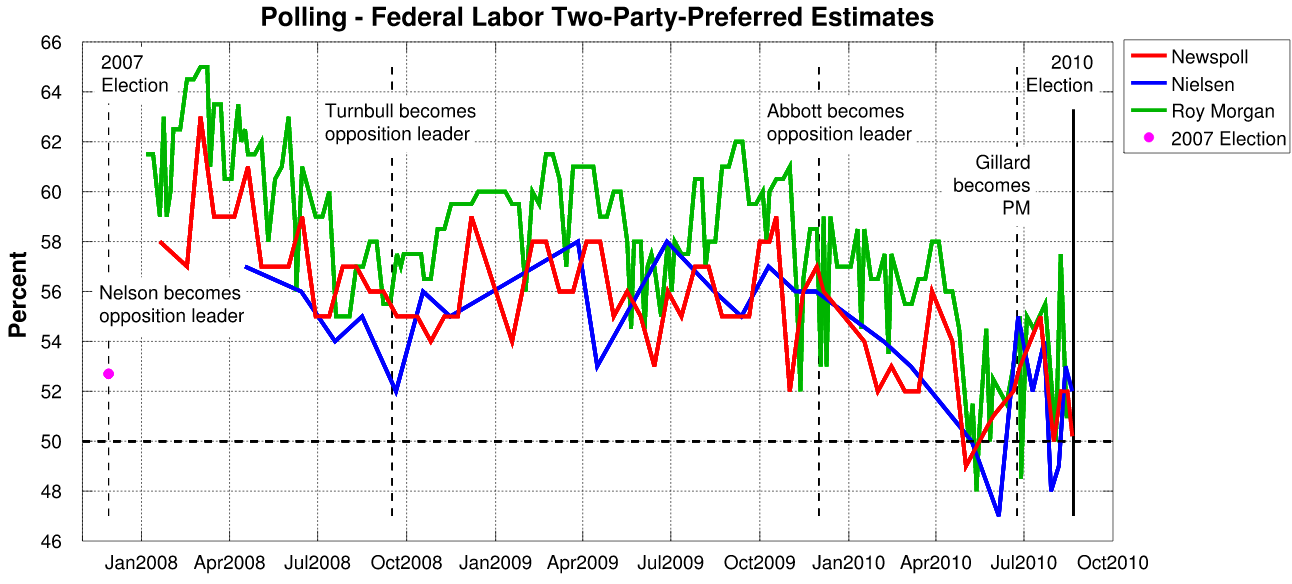
Polls showed that Kevin Rudd was a popular PM who was deposed by his own party as soon as his public approval dipped below 50%. It was later revealed that Julia Gillard’s staff were drafting her acceptance speech two weeks before she ousted Rudd as Australian PM. Australian Ambassador to the USA, Kim Beazley, was also briefing Hillary Clinton on the leadership change a fortnight before it happened.
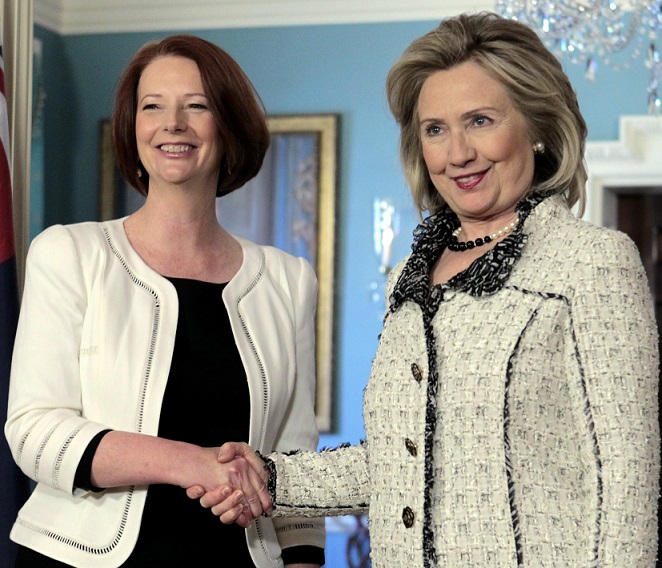
Julian Gillard was an unpopular Prime Minister who called a party ballot to shore up her failing support ahead of the 2013 election. She lost the ballot to Kevin Rudd, who became Prime Minister again for three months, but he then lost the subsequent federal election to Tony Abbott (see below) and retired from politics. Gillard became a Senior Fellow at the US Brookings Institution thinktank and chairperson of the Clintons’ Global Partnership for Education. She was a vocal supporter of Hillary Clinton’s failed 2016 US Presidential Campaign, appearing on stage at rallies and writing articles in US media. As Prime Minister, Gillard established routine donations of millions of Australian taxpayer dollars to the Clinton Foundation.
*
It was not just Australia’s Labor Party government who was deliberately ignoring Assange’s plight. In a July 2012 radio interview, the leader of the opposition Liberal Party, Tony Abbott - who became Prime Minister in 2013 - expressed near-total disinterest in the Assange case. Abbott cemented his sycophancy to the United States weeks later by claiming that "few Australians would regard America as a foreign country". The only Australian political party that consistenly supported Julian Assange were the Greens, who habitually won only around 10% of the vote at elections.
Christine Assange declared that she was sick of politicians ignoring the facts:
"This is the problem that I’ve got with this commentary all along, is that neither Gillard, Abbott, or the appointed henchmen Carr and Roxon are telling the people the facts. And there’s fact after fact after fact that indicates that this is nothing more than a political persecution to silence the truth. And what does the Australian government do - all except the Greens - is aid and abet that political persecution."
Mrs Assange also admitted that the many months of pressure were taking a heavy toll on her.
"I live with terror. Absolute terror. Nightmares all night…
"I wish he’d never done it, as a mother, to be frank. But as a citizen, I am so proud of him. I am so proud of WikiLeaks, and that courageous little team of half a dozen people."
*
The Syria Files
3 July 2012 was Julian Assange’s 41st birthday. Supporters sent online greetings via the hashtag #JA41. WikiLeaks Central delivered a batch of birthday emails to the Ecuadorian embassy. A scene from the movie "RISK" shows Assange inside the embassy, helping Sarah Harrison prepare to face the glare of media attention at the Frontline Club.
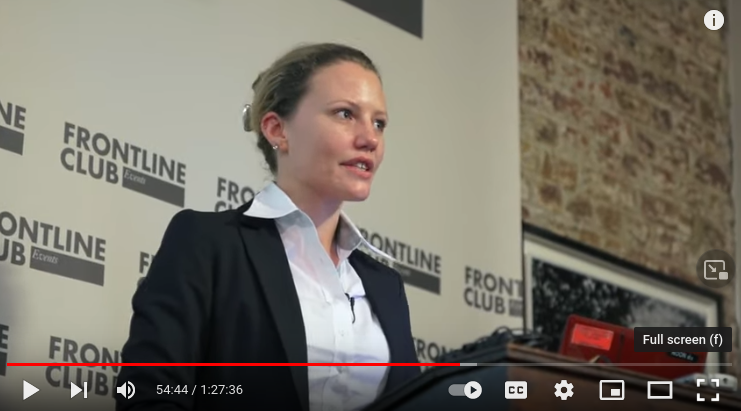
Two days later, Harrison announced that WikiLeaks had begun publishing the Syria Files - "more than two million emails from Syrian political figures, ministries and associated companies, dating from August 2006 to March 2012". Media partners included Lebanon’s Al Akhbar newspaper, Egyptian daily Al-Masry Al-Youm, plus Italian, German, French and Spanish outlets. Journalists at the Frontline Club repeatedly asked about Mr Assange, but Harrison politely declined to answer their questions: WikiLeaks wanted the media’s attention on their leaked documents.
The release included 2,434,899 emails from 680 domains, with 678,752 different email senders and 1,082,447 different recipients. There were 400,000 emails in Arabic and 68,000 emails in Russian. The data was more than 100 times the size of Cablegate. Thousands of emails were infected with viruses or trojans, so WikiLeaks built a new "general-purpose, multi-language political data-mining system".
Arab Spring protests had escalated into a civil war in Syria, with between 6,000 and 15,000 people killed in the previous 18 months. WikiLeaks said the Syria Files would shine a light on the inner workings of the Syrian government and economy, but also reveal the hypocrisy of Western governments and companies.
"The material is embarrassing to Syria," said Assange, "but it is also embarrassing to Syria’s opponents. It helps us not merely to criticise one group or another, but to understand their interests, actions and thoughts. It is only through understanding this conflict that we can hope to resolve it."
The emails revealed that Syrian President Bashar al-Assad and his wife Asma had shown little interest in the Arab Spring protests, focussing instead on their palatial gardens, renovations, and the stationary needs of low-level employees. Asma al-Assad went on a £270,000 online shopping spree as the violence was escalating. Meanwhile an Italian conglomerate was supplying al-Assad with telecomunications equipment and engineers, and a US firm, Brown Lloyd James, was advising the Syrian government "on how to create the appearance it is pursuing reform while repressing the uprising". The company recommended a public relations campaign to "create a reform echo-chamber".
The Syria Files release was widely seen as proof that WikiLeaks would be able to continue functioning even though Assange was now trapped in the embassy. A group of #Anonymous teams claimed to be the source of the leak, and continued campaigning against censorship and human rights abuses in Syria for months to come.
*
Breaking The Blockade
On 18 July 2012 WikiLeaks announced a new path through through the global banking siege: French non-profit group FDNN (Fund for the Defense of Net Neutrality - Fonds de Défense de la Net Neutralité) had set up a Carte Bleue fund for WikiLeaks. WikiLeaks said VISA and MasterCard were contractually barred from directly cutting off merchants through the Carte Bleue system. Nevertheless, Assange expected the new route for donations to be blocked soon, and urged supporters to donate quickly:
"We beat them in Iceland and, by God, we’ll beat them in France as well. Let them shut it down. Let them demonstrate to the world once again their corrupt pandering to Washington. We’re waiting. Our lawyers are waiting. The whole world is waiting. Do it."
Weeks later, WikiLeaks supporters were stunned to see a new article by former New York Times editor Bill Keller calling for an end to the banking blockade:
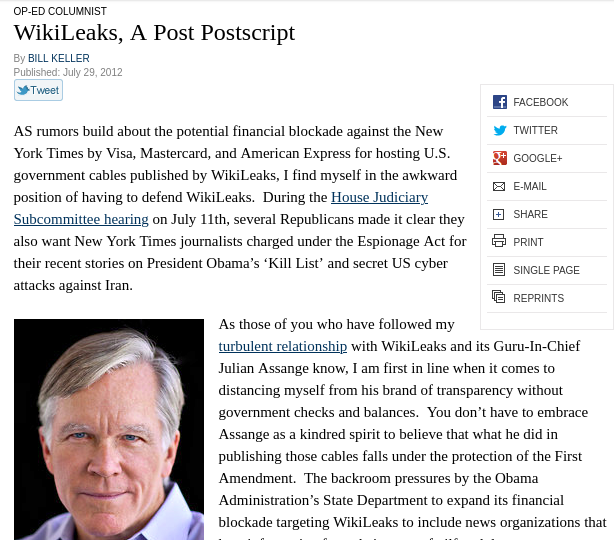
Even after Wikileaks’s first victory against Visa in Iceland, I still must urge Visa, Mastercard, and American Express to take a similar stand against the use of financial embargos to prohibit supporters from contributing or subscribing to media organizations protected by the First Amendment and free speech laws.
The article turned out to be a clever hoax but it fooled a host of journalists - including Glenn Greenwald and the New York Time’s own tech writer - before it was exposed. Even Bill Keller himself was fooled into tweeting a link to the fake article. WikiLeaks posted a string of tweets tracking reactions before finally admitting that they and their "great supporters" were responsible.
The usual critics were not impressed - even Greenwald grumbled about professional media ethics - but the witty protest action was clearly justified.
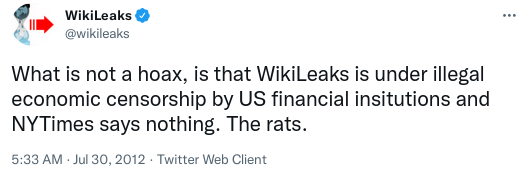
Ecuador Grants Asylum
By August 2012 Christine Assange was in Ecuador’s capital Quito, where she first met with Foreign Minister Ricardo Patiño and then President Rafael Correa. Mrs Assange said had not come to demand asylum for Julian but "to humbly ask, as his mother." Patiño said he was shocked by some of the facts that Mrs Assange revealed to him. Christine Assange thanked the government of Ecuador "for paying attention to the information I have given, which is more than my own government will do."
Ecuador’s El Telegrafo newspaper reported Mrs Assange’s claims that her phones were tapped, her 21-year-old grandson has had received death threats, her father was sick and might not be able to see Julian before he died, and the whole family was suffering symptoms of chronic stress. She briefly broke down in tears during a press conference.
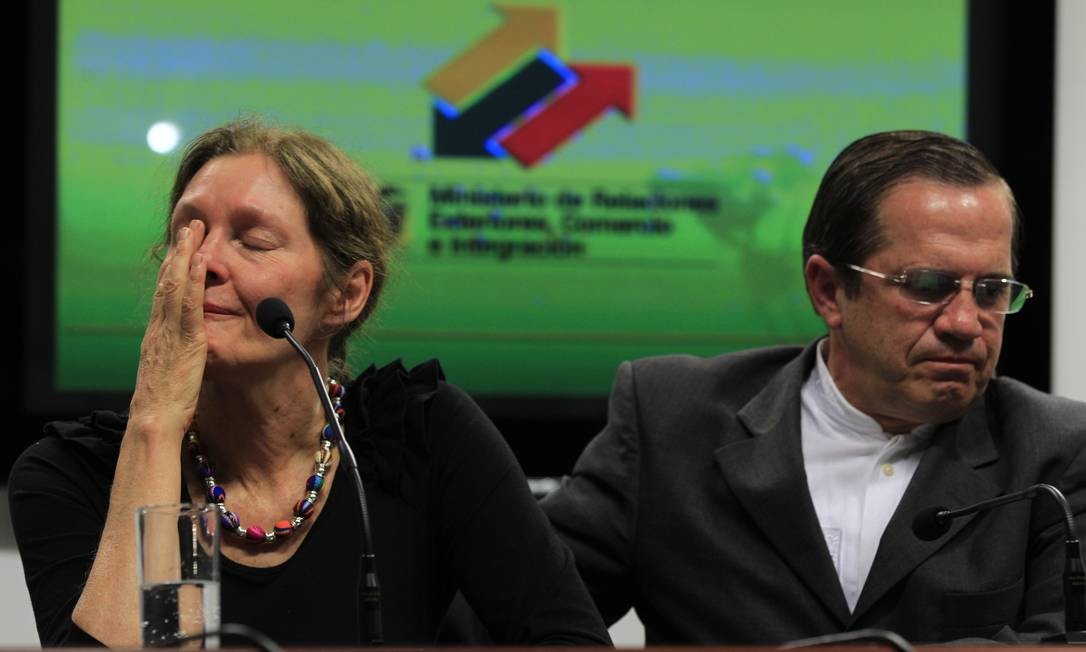
Mr Patiño revealed that the Ecuadorian embassy in Sweden had asked the Swedish government to come to London to question Julian Assange, but their request was declined.

In an effort to maintain good relations with Britain, Ecuador had promised not to announce their decision on asylum before the London Olympic Games finished on Sunday 12 August 2012. Curiously, all major UK party leaders - Tory Prime Minister David Cameron, deputy Prime Minister Nick Clegg of the Liberal Democrats, and leader of the opposition Ed Milliband of the Labour Party - went overseas on holidays immediately after the Olympics, leaving Foreign Secretary William Hague as Acting Prime Minister.
On Wednesday 15 August 2012, three days after the Closing Ceremony, Ecuador revealed that Britain had threatened to forcibly invade their sovereign Embassy in London and grab Julian Assange. A letter delivered by a British Embassy official in Quito stated:
"You need to be aware that there is a legal base in the UK, the Diplomatic and Consular Premises Act 1987, that would allow us to take actions in order to arrest Mr Assange in the current premises of the Embassy… We need to reiterate that we consider the continued use of the diplomatic premises in this way incompatible with the Vienna Convention and unsustainable and we have made clear the serious implications that this has for our diplomatic relations."
Ecuadorian officials stated that they were "deeply shocked" by this blatant disregard for the Vienna Convention, calling on the British government to help find a peaceful resolution to the situation. Instead, a UK Foreign Office spokeswoman doubled down on the threat of violence:
"We have an obligation to extradite Mr Assange and it is only right that we give Ecuador the full picture."
Crowds of WikiLeaks supporters immediately flocked to the Ecuadorian embassy and maintained a vigil through the night. UK Territorial Support Group police were posted inside the building’s front door, on the steps, and in vans outside. By midnight, according to a WikiLeaks statement, "the embassy had been surrounded by police, in a menacing show of force". Assange later said he could hear "teams of police swarming up inside the building through its internal fire escape".
On the next day, 16 August 2012, after two months of investigation, Ecuador’s Foreign Minister gave a lengthy press conference where he explained why his government was granting political asylum to the WikiLeaks Editor-in-Chief. Citing international legal treaties, he said Assange was the victim of political persecution and deserved the status of political refugee because his life was at grave risk. He said Sweden has refused to come question Assange in the embassy or provide guarantees of no onward extradition to the USA, while the USA itself had provided no further information. Ecuador’s decision was backed by the Union of South American Nations countries (Unasur) and the Bolivarian regional group ALBA. Numerous world leaders quickly voiced their support.
Assange thanked the Ecuadorean people, President Rafael Correa, and his government:
"It was not Britain or my home country, Australia, that stood up to protect me from persecution, but a courageous, independent Latin American nation. While today is a historic victory, our struggles have just begun. The unprecedented US investigation against WikiLeaks must be stopped.
Assange also urged people to remember Chelsea Manning, who had by then been detained without trial for over 800 days.
William Hague immediately declared that safe passage from the embassy to an airport would not be permitted.
"We will not allow Mr Assange safe passage out of the United Kingdom, nor is there any legal basis for us to do so. The United Kingdom does not recognise the principle of diplomatic asylum."
Sweden summoned Ecuador’s ambassador to Stockholm, saying the granting of asylum to Assange was "unacceptable". Wikileaks tweeted that Assange would appeal to the International Court of Justice if he was not allowed to travel to Ecuador. The US-backed Organisation of American States (OAS) voted to hold an urgent meeting in Washington, even though the USA voted against it - OAS states didn’t want to discuss the granting of asylum, but the unprecedented threat to invade diplomatic missions. Australia’s useless Foreign Minister Bob Carr said his government would not be making "representations one way or the other."
So what stopped the British government just invading the embassy? The Foreign Office (FCO) declared that their only legal obligation was to give Ecuador seven days notice of the intrusion.
Former British Ambassador Craig Murray, who had previously sheltered dissidents inside the British embassy in Uzbekistan, blogged that he had received "private confirmation from within the FCO that the UK government has indeed decided – after immense pressure from the Obama administration – to enter the Ecuadorean Embassy and seize Julian Assange". He said William Hague was "supporting the move against the concerted advice of his own officials" while Justice Minister Kenneth Clarke "has been opposing the move against the advice of his".
"I gather the decision to act has been taken in Number 10," wrote Murray. "There appears to have been no input of any kind from the Liberal Democrats."
At that time, UK Prime Minister David Cameron was in a minority government with the Liberal Democrat party, whose opposition to the idea became critically important. British police "cannot just go barging into the embassy", declared the Liberal Democrat peer Lord Carlile.
PM Cameron conducted the first major reshuffle of his coalition government just days later, on 4 September 2012, moving Kenneth Clarke from Justice Secretary to "Minister without Portfolio".
Craig Murray later explained the politics in more detail:
"Most Liberal Democrat MPs are happy to endorse the notion that Assange should be returned to Sweden to face sexual accusations. However even the repeatedly humiliated Lib Dem MPs would revolt at the idea that Assange should be sent to face life imprisonment in solitary confinement in the United States for the work of Wikileaks. That is why the United States has held off requesting extradition from the United Kingdom, to avoid the trouble this would cause Cameron. I am not speculating, there have been direct very senior diplomatic exchanges on this point between Washington and London."
This was a critically important point that was totally ignored by media coverage. Assange critics regularly claimed that he could just as easily be extradited to the USA from Britain as from Sweden, so therefore his efforts to avoid extradition to Sweden were deeply suspect. But in fact Sweden had a fast-track extradition deal with the USA, they had extradited CIA targets who were tortured, and they openly admitted that Assange would immediately be jailed upon arrival.
When Britain’s New Statesman magazine published false claims about extradition to Sweden, Glenn Greenwald called them out:
This is the paramount issue because it shows that it is not Assange and Ecuadorean officials – but rather the Swedish and British governments – who are preventing the sex assault allegations from being fairly and legally resolved as they should be.
As Greenwald had previously noted, any Swedish-US transactions concerning Assange would be conducted beyond public scrutiny:
Ironically, even the US State Department condemned Sweden’s "restrictive conditions for prisoners held in pretrial custody", including severe restrictions on their communications with the outside world.
*
Three days after Ecuador granted him asylum, exactly two months since he had entered the embassy, and despite the obvious dangers, Julian Assange addressed a huge crowd from the balcony of the Ecuadorian embassy.
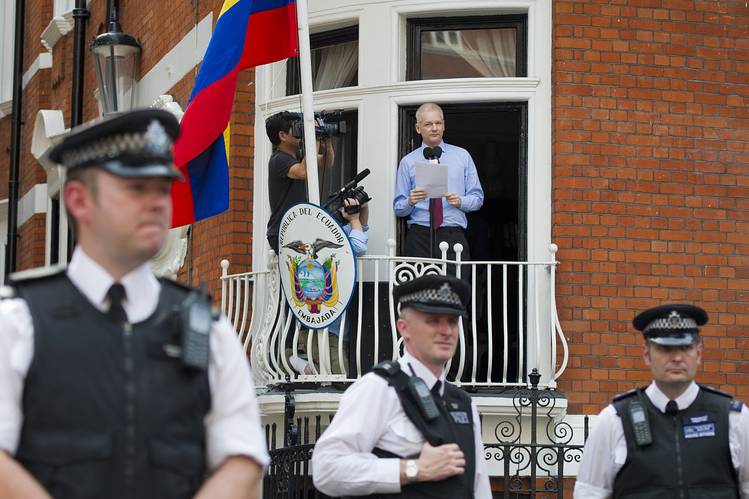
He thanked supporters for gathering on the street at night after UK police had begun to storm the diplomatic post:
"On Wednesday night, after a threat was sent to this embassy, the police descended on this building. You came out in the middle of the night to watch over it, and you brought the world’s eyes with you. Inside this embassy, in the dark, I could hear teams of police swarming up inside the building through its internal fire escape. But I knew there would be witnesses, and that is because of you.
"If the UK did not throw away the Vienna Conventions the other night, it is because the world was watching. And the world was watching because you were watching."
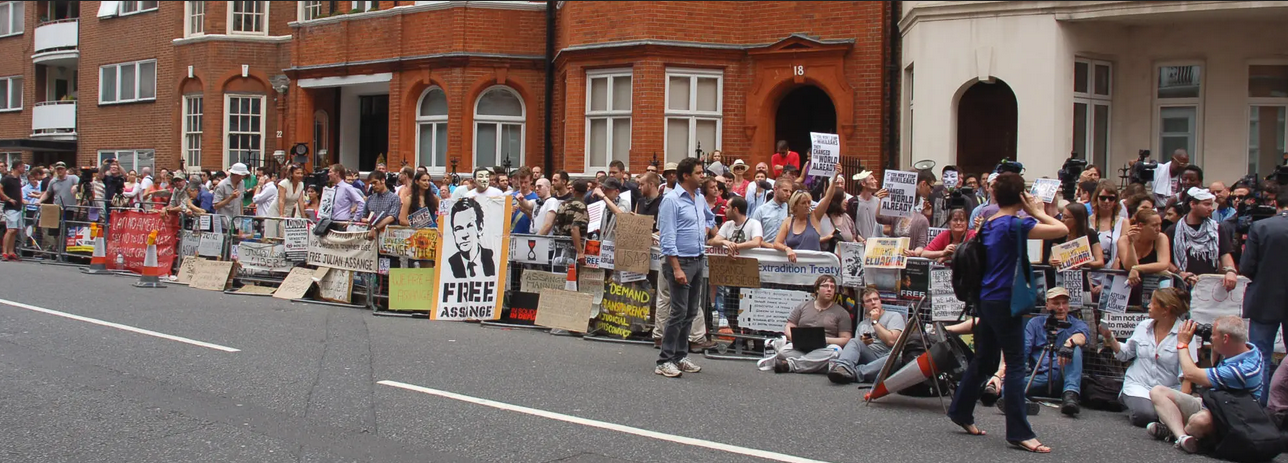
Assange called for the US government to “renounce its witch hunt” against WikiLeaks.
"There must be no more foolish talk about prosecuting any media organisation, be it Wikileaks or the New York Times. The US war on whistleblowers must end."
He expressed his solidarity with the cases of Chelsea Manning and Russian activists Pussy Riot, who had recently been jailed for denouncing President Vladimir Putin in a Moscow cathedral.
"As WikiLeaks stands under threat, so does the freedom of expression and the health of all of our societies… There is unity in the oppression. There must be absolute unity and determination in the response."
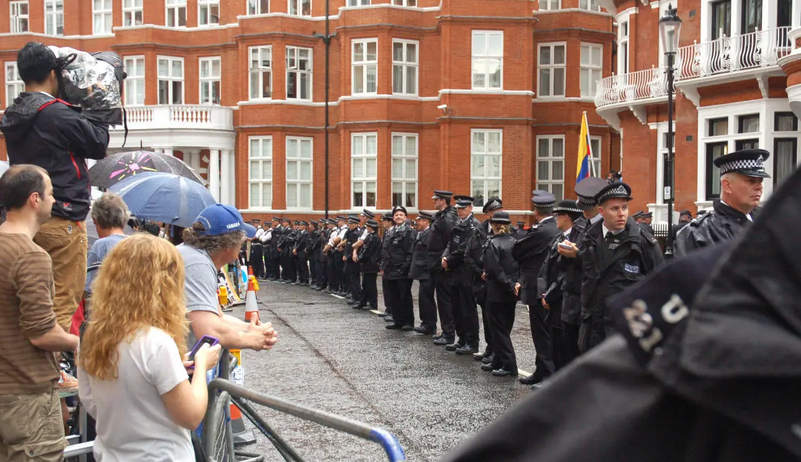
Assange did not mention the Swedish allegations - what could he say? - prefering to focus on the more critical issue of US extradition. But of course this left him open to attack from the usual media critics.
A Guardian editorial insisted that "Miss A and Miss W are at the heart of this story" and there was "no serious evidence that Washington plans to start [extradition] proceedings". The editorial, which was closed to comments, claimed there were only about 100 people at the event (supporters estimated up to 300) and bizarrely blamed Assange for the fact that Swedish prosecutors still had not contacted him.
"This champion of radical transparency hasn’t helped Swedish prosecutors with their inquiries."
Guardian journalist Luke Harding, who had been sent to live-tweet Assange’s speech, ridiculed him as "the balcony Bolívar of Knightsbridge" and repeated that the Swedish allegations were "separate from any theoretical attempt to indict him in the US".
WSWS suggested the Guardian staff should read an article by Assange’s US attorney Michael Ratner, titled "Julian Assange is right to fear US prosecution", which they themselves had published just weeks earlier.
UK media attacks were not limited to the Guardian, however - other outlets followed the same script:
The Sun complained that Assange’s speech was “long on egotistical claptrap, but oddly failed to mention what this extradition case is actually about — the rape of one woman and sexual molestation of another.”
The Independent editorialised that Assange “is all but incarcerated in the Ecuadorean embassy not because he is a fighter for freedom but because he is wanted in Sweden over wholly unrelated allegations of sexual assault.”
Britain’s Foreign Office responded to Assange’s speech with a thinly veiled threat, posting a website story about the danger of falling from balconies.

Four days after Assange’s balcony speech, British advocacy group "Women Against Rape" published an article that demolished the dominant media narrative.
For decades we have campaigned to get rapists caught, charged and convicted. But the pursuit of Assange is political…
Justice for an accused rapist does not deny justice for his accusers. But in this case justice is being denied both to accusers and accused. The judicial process has been corrupted…
The authorities care so little about violence against women that they manipulate rape allegations at will, usually to increase their powers, this time to facilitate Assange’s extradition or even rendition to the US.
*
CIA Interferes in Ecuador Politics
Another key issue at this time was that Ecuador was due to hold elections in February 2013 and Washington insiders fully expected President Correa to be defeated. Media reports at the time claimed that CIA drug money was being deployed to help destabilize Correa’s government. The story was of course ignored by Western media but it was not just idle speculation.
In February 2012, Italian police had opened the Ecuadorean government’s diplomatic mail on arrival in Rome and found nearly 90 pounds (40 kilos) of cocaine. Ecuador’s Foreign Minister Ricardo Patiño said the diplomatic mail had been inspected by police dogs before leaving Ecuador, and had travelled to Italy through a “third country”. Chilean journalist Patricio Mery claimed the drugs were placed inside Ecuador’s diplomatic mail by people connected with the Chilean embassy in Quito.
“This was a scene created to damage the image of Ecuador. I saw the diplomatic seals and they were Chilean, so Ecuador could not re-examine the mail as it was from a third country. The plan was that the mail should leave with a Chilean seal but arrive in Italy with Ecuadorean seals.
Mery said the CIA was running an Iran-Contra style drug operation, trafficking “about 200 kilos of cocaine per month” from Bolivia through Chile in order to fund anti-Correa operations. In January 2013 one of Mery’s sources, a former detective who spent 16 years with Chile’s PDI (Policia de Investigaciones), followed Assange’s example by seeking refuge in the Embassy of Ecuador in the Chilean capital Santiago, claiming he had received multiple death threats, had been followed by Chilean government agents, and his life was in grave danger.
Chile’s President at the time, Sebastián Piñera, was the son of a former ambassador to the USA. His brother was a former minister of US-backed Chilean dictator Augusto Pinochet.
*
Craig Murray blogged that the CIA was seeking to swamp Correa. He said the USA had been shocked by Hugo Chavez’s recent return to power in Venezuela and did not want to make the same mistake in Ecuador:
"I learn that the US budget, using mostly Pentagon funds, devoted to influencing the Ecuadorean election has, since the Venezuelan result, been almost tripled to US $87 million. This will find its way into opposition campaign coffers and be used to fund, bribe or blackmail media and officials…
"My US source however is adamant that the Obama adminstration will not actually use the funds to incite another military coup attempt against Correa. That has apparently been ruled out. Assange being expelled into the arms of the CIA by a newly installed military dictatorship might be a difficult sell even for our appalling mainstream media."
*
On 26 September 2012 Julian Assange made an address via satellite to a United Nations forum in New York. He called on the USA to to cease its persecution of WikiLeaks and Chelsea Manning, and condemned US President Barak Obama for failing to back up his "audacious" rhetoric with real action. He challenged Obama’s recent assertion, for example, that the "United States supported the forces of change" in the Arab Spring:
"Tunisian history did not begin in December 2010. And Mohammed Bouazizi did not set himself on fire so that Barack Obama could be reelected."
Assange also revealed new documents, published on the WikiLeaks website, which showed the US government was now officially referring to WikiLeaks as the "enemy" with their alleged "victims" being labelled "society".
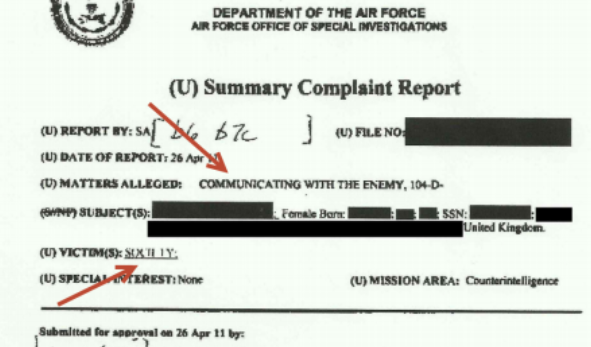
Assange said these documents, released under FOIA laws, had been shown to Ecuadorian officials while they were determining if his case warranted the granting of asylum.
We had those documents for some months and of course were very concerned about them, but it was necessary to conduct, because of the sensitivities of some of the people involved in that investigation, to prevent their release until more recently.
The documents came from a US Air Force investigation of one of their cyber systems analysts, who while based in Britain had allegedly expressed support for WikiLeaks and attended pro-Assange demonstrations in London. The analyst’s access to classified information had been suspended but no charges were laid.
As Fairfax journalist Philip Dorling noted, US military personnel who contacted WikiLeaks or even WikiLeaks supporters were now at risk of being charged with "communicating with the enemy", a military crime that carries a maximum sentence of death. Glenn Greenwald suggested two possible interpretations: either Assange and WikiLeaks were now being classified as "the enemy" (just like Al Qaeda or ISIS terrorists) or else any new leaks of US classified information were now being characterized as "aiding the enemy" (on the basis that terrorists would thereby get access to it).
If someone can be charged with "aiding" or "communicating with the enemy" by virtue of leaking to WikiLeaks, then why wouldn’t that same crime be committed by someone leaking classified information to any outlet: the New York Times, the Guardian, ABC News or anyone else? In other words, does this theory not inevitably and necessarily make all leaking of all classified information - whether to WikiLeaks or any media outlet - a capital offense: treason or a related crime?
Detainee Policies
On 25 October 2012, WikiLeaks began publishing more than 100 classified or restricted files from the US Department of Defense (DoD) covering the rules and procedures for detainees in US military custody. The Detainee Policies included Standard Operating Procedures (SOPs) for US detention camps in Iraq and Guantanamo Bay, interrogation manuals and Fragmentary Orders (FRAGOs), plus general DoD policies relating to Abu Ghraib, Guantanamo Bay and European US Army Prison facilities. The new files expanded on WikiLeaks' previous releases from Iraq and Guantanamo Bay, allowing readers to see how rules had evolved over time. Julian Assange asked:
"How is it that WikiLeaks has now published three years of Guantanamo Bay operating procedures, but the rest of the world’s press combined has published none?"
Cypherpunks Book
In November 2012 Assange published a book, "Cypherpunks: Freedom and the Future of the Internet", which expanded on his previous TV show discussions with Jacob Appelbaum, Andy Müller-Maguhn and Jérémie Zimmermann. In a typically hostile Guardian interview (laced with the usual smears about publishing unredacted names and working for Russian state media) Assange patiently explained that cryptography was now "the essential building block of independence for organisations on the Internet, just like armies are the essential building blocks of states".
"There is no other way for our intellectual life to gain proper independence from the security guards of the world, the people who control physical reality."
In a separate Guardian Op-Ed, Assange discussed his own role in making cryptoraphy available to individuals fighting state tyranny:
"It has been forgotten how subversive this was. Cryptography was then the exclusive property of states, for use in their various wars. By writing our own software and disseminating it far and wide we liberated cryptography, democratised it and spread it through the frontiers of the new internet."
Assange said the "new great game" was not a war for oil pipelines but the war for information pipelines: "the control over fibre-optic cable paths that spread undersea and overland". He noted how many of these pipelines flowed through the USA, and how many smaller governments were trying to maintain control of their sovereignty by purchasing cryptography devices that were made in the USA (complete with NSA backdoors). Assange said this was a huge problem for Latin American states like Ecuador, but China was also doing similar things in Africa.
Justice for Khaled El-Masri
On 13 December 2012 the European Court of Human Rights made an important finding that was based on evidence including six cables released by WikiLeaks. The court in Strasbourg found that the CIA’s abduction, rendition and torture of Khaled El-Masri, a Lebanese-born German citizen, "was established beyond reasonable doubt" and awarded him compensation.
El-Masri had been detained by Macedonian authorities while on holiday in Skopje in 2003, simply because his name was similar to a known terrorist. The CIA then secretly smuggled him out of Macedonia to a "black site" north of Kabul called the "Salt Pit". He was routinely interrogated, tortured and even sodomized for four months, then went on a hunger strike to protest his innocence. When US authorities finally examined his German passport and realised their mistake, they dumped him at night on a deserted roadside in Albania, with no apology and no money to get home.
El-Masri spent years trying sue the CIA, with help from the American Civil Liberties Union (ACLU), but in 2007 the United States Supreme Court refused to hear his case. The European court ruling marked the first time that the CIA’s treatment of detainees was legally declared as torture.
Six Months In The Embassy
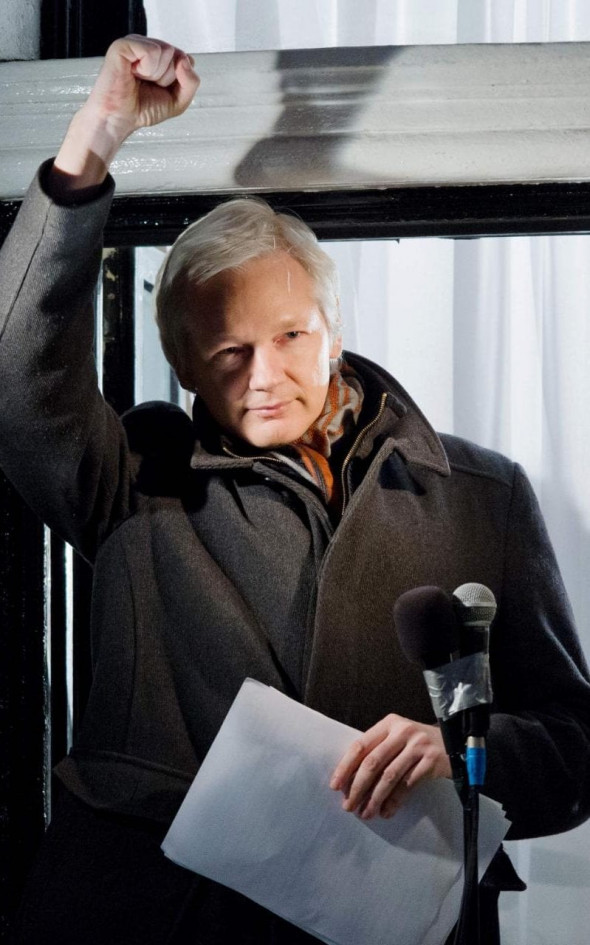
On 20 December 2012 Julian Assange again made a speech from the balcony of the Ecuadorian Embassy, where he had now been living for exactly six months. Assange again thanked supporters, the government and people of Ecuador, and journalists who "continue publishing the truth in the face of persecution, prosecution and threat".
While my freedom is limited, I am still able to communicate this Christmas, unlike the 232 journalists who are in jail tonight. Unlike Godfried Svartholm in Sweden tonight, unlike Jeremy Hammond in New York tonight, unlike Nabeel Rajab in Bahrain tonight, unlike Bradley Manning, who turned 25 this week…
Assange said WikiLeaks had "well over a million documents to release" in the year ahead, and the documents would "affect every country in the world". He declared that WikiLeaks had finally defeated the global financial blockade and contributions to WikiLeaks were now tax deductible across the European Union and the United States. He encouraged supporters to "learn how the world works" and "challenge the statements, actions and intentions of those who seek to control us".
Our buildings can only be as tall as their bricks are strong. And our civilization is only as strong as its ideas are true.
When our buildings are erected by the corrupt, when their cement is cut with dirt, when pristine steel is replaced by scrap, our buildings are not safe to live in.
And when our media is corrupt, when our academics are timid, when our history is filled with half truths and lies, our civilization will never be just. It will never reach the sky.
Our societies are intellectual shanty towns. Our beliefs about the world and each other have been created by same system that has lied us into repeated wars that have killed millions.
You can’t build a skyscraper out of plasticine. And you can’t build a just civilization out of ignorance and lies.
We have to educate each other. We have to celebrate those who reveal the truth and denounce those who poison our ability to comprehend the world we live in.
The quality of our discourse is the limit of our civilization.
*
Meanwhile, in Hawaii, a young man calling himself "Cincinnatus" was beginning to get frustrated. On 1 December 2012 he had sent an email to journalist Glenn Greenwald, asking him to install PGP (Pretty Good Privacy) software so they could communicate safely. He had some very important informtion to share, but Greenwald was ignoring his request. So he sent another email with step-by-step PGP installation instructions. He was still waiting for Greenwald to get back to him.
Cincinnatus was a figure in Roman history who allegedly left his home in the fields, at the request of his fellow citizens, to acquire nearly God-like powers over the Roman state. After quickly resolving the crisis in Rome, Cincinnatus relinquished his powers and returned to his farm. Edward Snowden also had some God-like powers available to him. But when he left his home five months later, he would not be returning for a long time.
*
The author of this book can be found on Twitter: @Jaraparilla
*
- NOTE
-
Full disclosure: several WikiLeaks Central links in this chapter were authored by me, Gary Lord aka @Jaraparilla. WikiLeaks Central was (is?) an unofficial supporters site that has collated news about WikiLeaks since 2010. I am very proud of all the articles I was able to publish on that site, and I am thankful they are still publicly available, unlike many of the archived mainstream media links in this book.
*
Home - Genesis - 2007 - 2008 - 2009 - Early 2010 - Mid 2010 - Late 2010 - End 2010 - Early 2011 - Mid 2011 - Late 2011 - End 2011 - Early 2012 - Late 2012 - Early 2013- Late 2013 - 2014 - 2015 - Early 2016 - Late 2016 - 2017-19
Copyright Gary Lord 2021, 2022, 2023